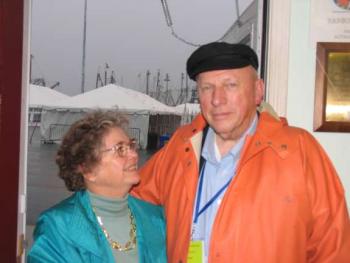Gloria and Samuel Cottle

The Working Waterfront Festival Community Documentation Project
This project documents the history and culture of the commercial fishing industry and other port trades. The project began in 2004 in conjunction with the Working Waterfront Festival, an annual, educational celebration of commercial fishing culture which takes place in New Bedford, MA. Interviewees have included a wide range of individuals connected to the commercial fishing industry and/or other aspects of the port through work or familial ties. While the majority of interviewees are from the port of New Bedford, the project has also documented numerous individuals from other ports around the country. Folklorist and Festival Director Laura Orleans and Community Scholar and Associate Director Kirsten Bendiksen are project leaders. The original recordings reside at the National Council for the Traditional Arts in Maryland with listening copies housed at the Festival's New Bedford office.
Janice Gadaire Fleuriel
Captain Samuel Cottle and Gloria Cottle are a married couple with a long history in the fishing industry. Captain Samuel Cottle is a fisherman who has used the ports of Point Judith, Rhode Island for his fishing activities. Gloria Cottle was born and brought up in Wakefield, Rhode Island, which is just several miles from Point Judith, a large fishing port. The couple resides in Albion, Maine. Captain Samuel Cottle's earliest memory of fishing dates back to when he was five years old. His great grandfather, who had fought in the Civil War, was a significant influence in his life. He first went to sea when he was six weeks old and has been involved in the fishing industry for most of his life. He started working as a paid fisherman at the age of eight under his grandfather, earning thirty-five dollars a week. Gloria Cottle met Samuel in high school during their senior year. They started dating and got married after graduation. They have been married for fifty-nine years.
Scope and Content Note
This interview with Captain Samuel Cottle and Gloria Cottle, conducted by Janice Gadaire Fleuriel, took place at the New Bedford Harbormaster House during the Working Waterfront Festival on September 27, 2008. The interview covers a wide range of topics related to the couple's personal background, family ethnic background, and involvement in fishing. Captain Samuel Cottle shares his experiences in the fishing industry, starting from his childhood memories with his great grandfather to his current activities. He talks about his first trip to sea when he was six weeks old, his work as a paid fisherman at the age of eight, and his experiences with his grandfather. Gloria Cottle shares her experiences growing up in Wakefield, Rhode Island, meeting Samuel in high school, and their life together after marriage. The interview also covers topics such as superstitions in the fishing industry, the couple's views on women on boats, unexpected catches, and stories of colorful characters they knew growing up.
Please Note: The oral histories in this collection are protected by copyright and have been created for educational, research and personal use as described by the Fair Use Doctrine in the U.S. Copyright law. Please reach out Voices@noaa.gov to let us know how these interviews are being used in your research, project, exhibit, etc. The Voices staff can help provide other useful resources related to your inquiry.
The NOAA mission is to understand and predict changes in climate, weather, oceans, and coasts, to share that knowledge and information with others, and to conserve and manage coastal and marine ecosystems and resources. The Voices Oral History Archives offers public access to a wide range of accounts, including historical materials that are products of their particular times, and may contain offensive language or negative stereotypes.
Voices Oral History Archives does not verify the accuracy of materials submitted to us. The opinions expressed in the interviews are those of the interviewee only. The interviews here have been made available to the public only after the interviewer has confirmed that they have obtained consent.
